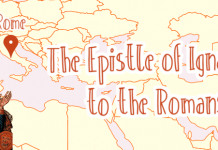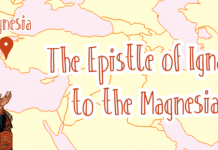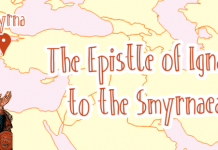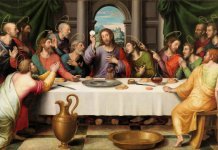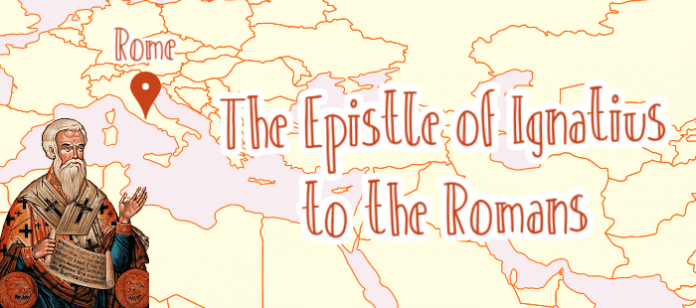The Epistle of Ignatius to the Romans
(sometimes
simply shortened to To the Romans
) is one of 7
authentic epistles by St. Ignatius of Antioch. The other
authentic epistles of Ignatius consist of 6 other
epistles to churches and 1 to his friend, St. Polycarp.
This epistle addressed to the church in Rome was written while Ignatius was in Smyrna, while on his way to face martyrdom in Rome.
Unlike the other epistles of Ignatius, this one is written to a community he has not met personally or through representatives. Ignatius includes the day and month he wrote the letter, perhaps to help prepare them for his arrival.
Probably anticipating his coming death, Ignatius shares his views on martyrdom in this epistle more than any other; even using Eucharistic imagery when describing it.
Date: 23rd August, around 110 AD.
Greeting
Ignatius, who is also called Theophorus, to the church which has obtained mercy, through the majesty of the Most High Father, and Jesus Christ, His only-begotten Son; the church which is beloved and enlightened by the will of Him that wills all things which are according to the love of Jesus Christ our God, which also presides in the country of the region of the Romans, worthy of God, worthy of honour, worthy of the highest happiness, worthy of praise, worthy of obtaining her every desire, worthy of being deemed holy, and which presides over love, walking in the law of Christ and bearing the Father’s name; which church I also salute in the name of Jesus Christ, the Son of the Father: to those who are united, both according to the flesh and spirit, to every one of His commandments; who are filled inseparably with the grace of God, and are purified from every strange taint, I wish an abundance of happiness unblameably, in Jesus Christ our God.
Chapter 1: As a Prisoner, I Hope to See You
Through prayer to God I have obtained the privilege of seeing your most worthy faces, and have even been granted more than I requested.
For I hope as a prisoner in Christ Jesus to salute you, if indeed it be the will of God that I be thought worthy of attaining unto the end. For the beginning has been well ordered, if I may obtain grace to cling to my lot without hindrance unto the end.
For I am afraid of your love, lest it should do me an injury. For it is easy for you to accomplish what you please; but it is difficult for me to attain to God if you spare me, but it is difficult for me to attain to God if you do not spare me, under the pretense of carnal affection.
Chapter 2: Do Not Save Me From Martyrdom
For it is not my desire to act towards you as a man-pleaser, but as pleasing God, even as also you please Him. For neither shall I ever have such another opportunity of attaining to God; nor will you, if you shall now be silent, ever be entitled to the honour of a better work.
For if you are silent concerning me, I shall become God’s; but if you show your love to my flesh, I shall again have to run my race.
Pray, then, do not seek to confer any greater favour upon me than that I be sacrificed to God while the altar is still prepared; that, being gathered together in love, you may sing praise to the Father, through Christ Jesus, that God has deemed me, the bishop of Syria, worthy to be found in the West, having summoned him from the East. It is good to set from the world unto God, that I may rise unto Him.
Chapter 3: Pray Rather That I May Attain to Martyrdom
You never grudged any one; you were the instructors of others. And my desire is that those lessons shall hold good which as teachers you enjoin.
Only pray that I may have power within and without, that I may not only speak, but truly will, so that I may not merely be called a Christian, but really found to be one. For if I be truly found a Christian, I may also be called one, and be then deemed faithful, when I shall no longer appear to the world.
Nothing visible is eternal.
For the things which are seen are temporal, but the
things which are not seen are eternal.
The Christian is not the result of persuasion, but of
power. When he is hated by the world, he is beloved of
God. For says the Scripture,
If you were of this world, the world would love its
own; but now you are not of the world, but I have chosen
you out of it: continue in fellowship with me.
Chapter 4: Allow Me to Fall Prey to the Wild Beasts
I write to all the churches, and impress on them all, that I shall willingly die for God, unless you hinder me. I beseech you not to show an unseasonable goodwill towards me. Suffer me to become food for the wild beasts, through whose instrumentality it will be granted me to attain to God.
I am the wheat of God, and am ground by the teeth of the wild beasts, that I may be found the pure bread of God. Rather entice the wild beasts, that they may become my tomb, and may leave nothing of my body; so that when I have fallen asleep in death, I may not be found troublesome to anyone. Then shall I be a true disciple of Jesus Christ, when the world shall not see so much as my body. Entreat the Lord for me, that by these instruments I may be found a sacrifice to God.
I do not, as Peter and Paul, issue commandments unto you. They were apostles of Jesus Christ, but I am the very least of believers: they were free, as the servants of God; while I am, even now, a servant. But when I suffer, I shall be the freedman of Jesus Christ, and shall rise again free in Him. And now, being in bonds for Him, I learn not to desire anything worldly or vain.
Chapter 5: I Desire to Die
From Syria even unto Rome I fight with beasts, both by land and sea, both by night and day, being bound to ten leopards, I mean a band of soldiers, who, even when they receive benefits, show themselves all the worse.
But I am the more instructed by their injuries to act as a
disciple of Christ; yet am I not thereby justified.
May I enjoy the wild beasts that are prepared for me; and I pray that they may be found eager to rush upon me, which also I will entice to devour me speedily, not as they have done to some, refusing to touch them through fear. But if they be unwilling to assail me, I will compel them to do so.
Pardon me in this, for I know what is my benefit. Now I begin to be a disciple. And let no one, of things visible or invisible, envy me that I should attain to Jesus Christ. Let fire and the cross; let the crowds of wild beasts; let tearings, breakings, and dislocations of bones; let cutting off of members; let shatterings of the whole body, and let all the dreadful torments of the devil come upon me: only let me attain to Jesus Christ.
Chapter 6: By Death I Shall Attain True Life
All the pleasures of the world, and all the kingdoms of
this earth, shall profit me nothing. It is better for me
to die on behalf of Jesus Christ, than to reign over all
the ends of the earth.
For what shall a man be profited, if he gain the whole
world, but lose his own soul?
Him I seek, who died for us: Him I desire, who rose again
for our sake. This is the gain that is laid up for me.
Bear with me, brethren. Do not hinder me from living; do not desire my death. Do not bestow on the world one who desires to be God’s, neither allure him with material things. Suffer me to receive the pure light. When I have gone, then shall I be a man. Permit me to be an imitator of the passion of my God. If any man has Him within himself, let him understand what I desire, and let him have fellow-feeling with me, for he knows the things which hinder me.
Chapter 7: Reason for Desiring to Die
The prince of this world would gladly carry me away and corrupt my disposition towards God. Let none of you, therefore, who are in Rome help him; rather be on my side, that is, on the side of God. Do not speak of Jesus Christ and yet set your desires on the world.
Don’t let envy have a home in you. Even if I myself,
when I am with you, should beseech you, don’t obey
me! Rather, believe the things which I write to you now.
For though I am alive while I write to you, I am eager to
die. My love has been crucified, and there is no fire in
me desiring to be fed; but there is within me a water that
lives and speaks, saying to me inwardly,
come to the Father.
I have no delight in corruptible food, nor in the pleasures of this life. I desire the bread of God, the heavenly bread, the bread of life, which is the flesh of Jesus Christ, the Son of God, who became afterward of the seed of David and Abraham; and I desire the drink of God, namely His blood, which is incorruptible love and eternal life.
Chapter 8: Be Favourable to Me
I no longer wish to live after the manner of men, and my desire shall be fulfilled if you consent. Be willing, then, that you also may have your desires fulfilled.
I entreat you in this brief letter; believe me. And Jesus Christ will reveal these things to you, so that you shall know that I speak the truth. He is the mouth altogether free from falsehood, by which the Father has truly spoken.
Pray for me, that I may attain the object of my desire. I have not written to you according to the flesh, but according to the will of God. If I shall suffer, you have wished well for me; but if I am rejected, you have hated me.
Chapter 9: Pray for the Church in Syria
Remember in your prayers the church in Syria, which now has God for its shepherd, instead of me. Jesus Christ alone will oversee it, and your love will also regard it.
But as for me, I am ashamed to be counted one of them; for indeed I am not worthy, as being the very last of them, and one born out of due time. But I have obtained mercy to be somebody if I shall attain to God.
My spirit salutes you, and the love of the churches which received me in the name of Jesus Christ and not as a mere passer-by. For even those churches which were not near to me en route (I mean according to the flesh) have gone before me, city by city, to meet me.
Chapter 10: Conclusion
Now I write these things to you from Smyrna by the hand of the Ephesians, who are worthy of all happiness. And Crocus also, a name very dear to me, is with me, with many others too.
As to those who have gone before me from Syria to Rome for the glory of God, I believe that you have received instructions; to whom make known that I am near. For they are all worthy, both of God and of you. And it is becoming that you should refresh them in all things.
I have written these things unto you, on the day before the ninth of the Kalends of September (that is, on the twenty-third day of August). Fare you well unto the end in the patient waiting for Jesus Christ. Amen.









